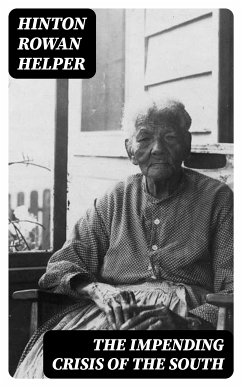
The Impending Crisis of the South (eBook, ePUB)
How to Meet It
Versandkostenfrei!
Sofort per Download lieferbar
1,99 €
inkl. MwSt.
Weitere Ausgaben:

PAYBACK Punkte
0 °P sammeln!
The Impending Crisis of the South is a book by Hinton Rowan Helper. It provides info and stats to make the case that slavery in the US was less lucrative than free labor and essentially disadvantaged the South instead enriching it.
Dieser Download kann aus rechtlichen Gründen nur mit Rechnungsadresse in A, B, BG, CY, CZ, D, DK, EW, E, FIN, F, GR, H, IRL, I, LT, L, LR, M, NL, PL, P, R, S, SLO, SK ausgeliefert werden.













